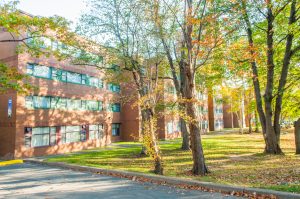Housing Information

While NSCAD University does not offer on-campus residences, we’re here to help you find the perfect place to call home during your studies. The following are some resources to guide you in your accommodation search.
Halifax is home to several universities, some of which have special residence arrangements with NSCAD. As a NSCAD student, you have access to residence spaces (subject to availability) at partner universities, including Saint Mary’s University (SMU), University of King’s College, Atlantic School of Theology and Mount Saint Vincent University (MSVU).
We also have trusted third-party residences that we have a relationship with: See-More Student Housing.
See-More Student Housing offers a variety of suite options tailored to student living; including, studio, 3, 4 and 5 bedroom layout. Each suite is fully furnished and equipped with amenities like a dishwasher, refrigerator, stove, oven and microwave.
How to Apply
Click here for a step-by-step infographic guide to applying for on-campus accommodations at each partner university. Links to application portals and additional documents provided by the residence departments are included within the infographic.
Don’t miss out on securing your spot—explore your options and apply today!
Contact Information

Saint Mary’s University (SMU)
Housing & Residence Office
Saint Mary’s University
923 Robie Street
Loyola Residence, Room 114
Halifax, NS, B3H 3C3
Email: residence.housing@smu.ca
Phone: 902-420-5598
Fax: 902-496-8107

University of King’s College
Residence & Housing Office
University of King’s College
6350 Coburg Road
Halifax, Nova Scotia B3H 2A1
Email: residence@ukings.ca
Phone: 902.422.1271 – ask for residence
Fax: 902.423.3357

Atlantic School of Theology
660 Francklyn Street
Halifax, NS B3H 3B6
Bobbi Zahra, Residence Manager
Email: Bobbi.Zahra@astheology.ns.ca

Mount Saint Vincent University (MSVU)
Residence Life Office
Mount Saint Vincent University
201A Evaristus
166 Bedford Highway
Halifax, Nova Scotia, B3M 2J6
Email: Residence@msvu.ca
Phone: 902-457-6356
Searching for an apartment and finding roommate(s) to sublet the cost can be challenging. Below are some helpful resources to help you search for a place to live, understand lease agreements, and know your rights as a tenant.
Private Residences
Most commonly, students will rent furnished rooms from private owners or share an apartment, flat, or house with other students.
Please be aware that NSCAD is not affiliated with any of these websites, and we caution you to be aware of rental scams when seeking housing on these sites. Click here for Nova Scotia Residential guide for tenants and landlords with multiple languages.
Granville Hall is a private student residence building, another residence option that’s located in downtown Halifax, about a block away from NSCAD Fountain campus.
Moore Suites offers temporary furnished accommodations for transition between residents for international and domestic out-of-city students.
Below are various property management sites across Halifax Regional Municipality (HRM), including Dartmouth, Halifax, and Bedford. Please check the individual websites for more details.
- Vida
- Southwest
- Killam Apartment REIT
- Northpoint
- Universal Realty Group
- Templeton Properties
- Twin City
- Open Door Property Management
- Harrington Housing
- Canadian Apartment Properties REIT
- Panoramic Properties Inc
- Happy Place Property Management
Homestays For International Students
Homestays are an affordable and practical alternative to traditional on campus and private housing. You will be personally matched with a local host family that offer a friendly and nurturing home environment for you to stay in. Canada Homestay Network (CHN) manages Homestay for NSCAD University.
Application Process
Click here for more details on homestays for NSCAD students and how to apply. Before you apply, be sure to review the organization’s website for more information regarding meal plans, pricing, and available resources for homestay students.
Accommodations include (but are not limited to):
- Furnished room with a window
- Clean bed with sheets, pillows, blankets, etc.
- Private storage
- Access to a shared bathroom
- A quiet place to study
Online Resources
Listings for available accommodations can be found online through various social media platforms and search engines including:
- Kijiji
- Facebook Marketplace
- University Apartments
- 444Rent
- RentCafe
- Zoeken Canada
- Rentals.ca
- Rent Seekers
- Point2
- Zumper
- Places4students
NSCAD yard $ale Facebook Group is a place for the NSCAD community (and beyond) to sell, trade, or search for items that aren’t quite ready for the love dumpster yet. This can include textbooks, art supplies, furniture, clothing, etc. People will often post ads seeking roommates here! Check it out and join the group
Homes for Queers Halifax is another Facebook housing group for all the queer, trans, two-spirit, other 2SLGBTQIA+ umbrella friends of Halifax to help you find lovely housemates and safe happy homes. Post an ad on the wall/discussion board for your spare room, or to find people to start a new house share. Check out this unique group for more details.
Before choosing to live in a student residence, there are items you should consider while determine if the residence properly fits your needs. This means doing some research to ensure that you will be happy with your choice of residence.
Dorms
Living in residence is not like living in an apartment. Quite often you will be living with a roommate who you may not know. While all dorms have different rules, commonly prohibited items and activities include:
· Candles · Microwaves · Toasters · Air fryers · Panini presses · Fridges · Pets | · Space heaters · Alcohol (certain floors only) · Any drug paraphernalia · Drugs* · Smoking indoors · Large furniture (beds, couches, etc.) · Incense |
In many cases single and double rooms do NOT have personal washrooms, kitchens, or laundry. These are usually shared spaces.
*Even though cannabis is legal in Canada, consuming drugs while on campus is usually strictly prohibited, even outside on residence properties.
Rules and Regulations
Living in residence comes with specific rules and regulations to ensure a safe and enjoyable living environment for all residents. Here are some common guidelines you can expect:
- Meal Plans – Many residences require residents to purchase a mandatory meal plan, regardless of usage. Be sure to check each residence’s policy regarding meal plans before making your decision.
- Guest Policies – Residences typically regulate the number of guests allowed, their duration of stay, and areas they can access within the residence. This helps maintain security and respect for all residents.
- Noise Control – To maintain a conducive environment for studying and rest, noise should be kept to a minimum, especially during Quiet Hours. These hours are usually enforced during the nighttime and exam periods.
- Conflict Resolution – If conflicts arise between roommates or other residents, most residences have a mediation process facilitated by a Residence Assistant (RA) to help resolve issues amicably.
Residence Life
Living on campus offers more than just a place to stay—it’s an opportunity to immerse yourself in a vibrant community and build lasting friendships. Here are some benefits of residence life:
- Social Opportunities – Residence provides a unique environment to meet new people and engage in various social activities, enhancing your university experience.
- Built-in Support – University life can be challenging at times, but living in residence offers built-in support systems, such as RAs and resident events, to help you navigate academic and personal challenges.
What is a lease?
A lease is a legally binding agreement signed between the tenants and the landlords. You as a tenant are responsible for whatever is written in the lease. Copies MUST be identical and held by both the tenant and landlord. In Nova Scotia there are three types of leases: monthly, yearly or fixed-term (beginning and ending on specific days).
It is extremely important to carefully read your lease. Leases in Nova Scotia must follow certain standard details, but certain rules and stipulations can be added by the landlord. The Standard Form of Lease can be found here. Always refer to Residential tenancy forms from the Nova Scotia Residential Tenancies Program when you are unsure.
Residential Tenancies Act & Regulations
If you have any concerns about certain rules or regulations in your lease, disputes between you and your landlord, or other issues you may have while renting, please make sure you review residential tenancy policies from Nova Scotia Residential Tenancies Program
Co-Signers/Guarantors
A co-signer (also known as a guarantor) is someone who, on behalf of the tenant, signs into an agreement with the landlord specifying that they will be liable for the rental unit or any other financial obligations.
- They are often requested when the landlord believes that a potential tenant will not be able to pay rent on their own. This requirement often applies to students, especially undergraduates who may be renting for the first time.
- As a renter, finding the proper co-signer is very important. You should choose someone reliable and close to you, such as parents, grandparents, guardians, etc. It should be someone financially secure.
The Nova Scotia Guarantee Agreements Policy describes how a landlord, and 1 or more guarantors may sign a guaranteed agreement for the financial obligations of a tenancy (lease) between a tenant and landlord. The Nova Scotia Guarantee Agreements Policy can be found under residential tenancy policies from Nova Scotia Residential Tenancies Program.
Dalhousie Legal Aid Service
Dalhousie Legal Aid Service is a community-based office in the north-central neighbourhood of Halifax, Nova Scotia. They provide legal services and advice, particularly to students who are renting in Halifax. If you find yourself in a dispute with your landlord, always reach out to Dalhousie Legal Aid before acting.
Dalhousie Legal Aid Servuce
5746 Russell Street
Halifax, NS, B3K 0H8
Email: legalaid@dal.ca
Phone: 902-422-8105
Red Flags
Please Refer to Dalhousie Legal Aid Service Tenant Rights Guide 2019
Searching for Housing
- If you are seeing multiple ads for the same apartment across different platforms, be suspicious.
- If possible, always go to apartment viewings to see the space with trusted friends, classmates, or family members.
- If it sounds too good to be true, it likely is. If you find a beautiful apartment for a low price with all amenities included, you should be alert and do more research to determine if the actual residence is accurate to the listing.
- A residence’s proximity to transit lines, grocery stores and other essential resources like health care is an important consideration – housing in remote locations can present daily challenges that could affect your studies.
- Thoroughly inspect the apartment. Look for rust, black mould, pests, low water pressure, etc. The landlord is responsible for addressing these issues and more.
- If you are considering living with a roommate, make sure you both have the same expectations and communicate regularly and honestly. Signing a lease with someone is a big responsibility; even if it is your best friend, think about your relationship and how you will live together.
- Pets – unfortunately, many rental units are not pet friendly. Unlike some other places in Canada, landlords are allowed to restrict pets. In many cases landlords will discriminate against pet owners when choosing a tenant for their property, even if it is listed as pet friendly.
Lease Agreements/Payments
- It is illegal for your landlord to refuse to provide a signed copy of the lease. If your landlord does not provide you a lease within 10 days, you can terminate your tenancy.
- Rental application fees are illegal. If a landlord asks you for an application fee, refuse and quit your application for the apartment.
- Never pay a deposit for a place you have not seen in person. If a landlord is unable to provide any viewings, this is a big red flag. Landlords can ONLY ask for a security deposit of 1/2 of the monthly rent. A landlord with any sense of urgency to collect a damage deposit should be considered very suspicious and treated with extreme caution. A landlord asking you to pay a deposit to secure keys is not only illegal, but is likely a scam as well.
- Paying in cash – never pay your rent in cash, even if a landlord is willing to provide receipts.
- Payment method – It is very unusual for a landlord to ask for a wire transfer as a lease payment. Wire transfers are not easily traceable and do not provide any official receipts.
- Never send any money to a third-party account.
- A landlord cannot raise your rent more than once every 12 months. This increase is capped at 5 per cent and your landlord must give you written notice (usually four months). Sometimes increases can be reduced by landlords if you can successfully explain how they will be detrimental for you.
- It is illegal for a landlord to ask for last month’s rent at the beginning of your lease. When your tenancy starts you are only required to pay a security deposit (1/2 month’s rent) and your first month’s rent.
- Paying more than one month’s rent at a time is in violation of the Tenancy Act. DO NOT AGREE to paying multiple increments (months) of rent at a time.
- If any amenities are not included in the rent, ensure you include the estimated costs in your monthly budget.
- Canada Mortgage and Housing Corporation (CMHC) – Rental Market Report, January 2023 [PDF]
- Dalhousie University Rental & Utility Costs Page
- Rental Market Report Highlights
- Budgeting Resources – Numbeo Cost of Living in Halifax
- Utilities
- Electricity
- Telephone, Internet & Television
- Nova Scotia Community College (NSCC) Cost of Living Resources
- Monthly Expense – Money Matters Financial Planning
Red Cross
Emergencies and disasters can occur in Canada. The Canadian Red Cross knows this and provides food, shelter, clothing, and essential supplies for up to 72 hours. You will be able to find the contact phone number 24/7 or a nearby emergency and disaster services centre.
Emergency Bursary
The NSCAD Student Emergency Bursaries assist students in difficult financial situations and have demonstrated a need for money to assist with unforeseen expenses. Students can apply for one emergency bursary per semester (Fall/Winter). Bursaries are typically valued at $500, possibly up to $700 under exceptional circumstances. Please complete the Needs-Based/Emergency Bursary Form via NSCAD Forms Portal.

